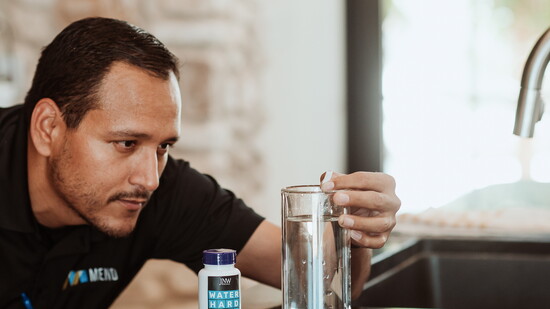Water touches everything we do, from our morning coffee and shower to a fresh salad or simmering soup. It nourishes our bodies, flavors our meals, and keeps our homes running smoothly. What’s coming out of your faucet can affect taste, health, and even your appliances. Knowing what’s in your water—and taking steps to protect it—can make all the difference.
It’s not uncommon to take a sip of water and feel like something is “off.” While most municipal water sources are treated to meet safety standards, that doesn’t mean it’s free from things you don't want in your drinking glass. And the same is true for well and rainwater in our area.
According to the Environmental Working Group, over 250 contaminants have been detected in U.S. tap water, including chlorine byproducts, heavy metals, and hard water minerals that contribute to buildup and appliance wear. Living in the Hill Country, we’ve all probably experienced those hard water issues in our bodies, on our hair, and at our plumbing fixtures.
So, what can you do?
Start by thinking of your plumbing system as the delivery network for your home’s most vital resource. Water softeners and purification systems work together to protect that network and your family’s health.
Water softeners combat our area’s hard water, which is loaded with calcium and magnesium. You’ll notice it on cloudy glassware, itchy skin, and stiff laundry. But it’s also quietly shortening the lifespan of your appliances, especially your water heater. Softened water helps prevent scale buildup, which means your system runs smoother, heats more efficiently, and lasts longer.
Water purification systems are your home’s defense against invisible threats like bacteria, lead, pesticides, and volatile organic compounds (VOCs). Depending on your local water quality and concerns, a whole-home or under-sink system can make a big difference in taste, odor, and safety. These systems are also a fantastic option for homes on rainwater.
At Mend, we also recommend regular water heater flushes and plumbing inspections. Stagnant water and sediment buildup can become a breeding ground for bacteria, not to mention put stress on your pipes and fixtures.
Here’s the deal: clean water doesn’t just happen. It’s the result of smart systems, preventative maintenance, and a little help from the pros.
If you’ve ever wondered what’s actually flowing through your faucets, it might be time for a water quality test and consultation. We’ll help you understand your home’s water grade and the steps you can take to improve it.
Clean water is peace of mind. Let’s make sure your water is working for you—not against you.
MendServices.com | @mendservices
Knowing what’s in your water—and taking steps to protect it—can make all the difference.
